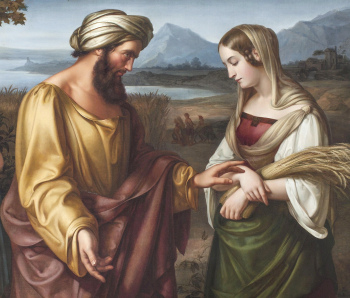Ruth 1
1. What caused Naomi and her family to travel to Moab? Answer
2. How did the nation of Moab start? Answer
3. Where did the Moabites live? Answer
4. What caused Naomi to leave Moab and return to Bethlehem? Answer
5. What was Ruth's beautiful response when Naomi assertively told her to go back to her Moabite home and find another husband amongst her own people? Answer
6. What name did Naomi want to be referred to when she moved back to Bethlehem? Answer
7. When did the barley and wheat harvest take place in Israel? Answer
Ruth 2
8. How could Ruth glean food from a field that was not hers? Answer
Ruth 3
9. How did Ruth gently propose the idea of marriage to Boaz? Answer
Ruth 4
10. What custom did Boaz perform to show before witnesses that he was exercising his right to marry Ruth? Answer
11. What was the law of God that underpinned the responsibility to redeem (marry) the wife of a dead close relative? Answer
12. What miracle is hinted at in this book? Answer
13. What made Obed, the son of Boaz and Ruth, critically important to Biblical history? Answer
Ruth 1 Answers
1. A famine had struck the land (verse 1).
[Greatest Famines in the Bible!]
2. Lot, after the destruction of Sodom and Gomorrah, was enticed to commit incest with his two daughters. Both daughters became pregnant, with the oldest producing a son name Moab who was the founder of the Moabites.
[What Caused Lot to Commit Incest?]
3. The land of Moab initially entailed territory, east of the Jordan River, which was both north and south of the Arnon River. The Amorites, however, conquered Moabite territory north of the Arnon River (Numbers 21:25 - 26). The kingdom was reduced to territory south of the Arnon to the Zered River.
4. Naomi, her husband Elimelech, and their sons Mahlon and Chilion moved to Moab. While in Moab Elimelech dies (verse 3). Naomi's two sons then marry Moabite women named Orpah and Ruth. After living in the land for 10 years both Mahlon and Chilion die (verses 4 - 5).
Naomi then hears, "how that the Lord had visited his people in giving them bread." (Ruth 1:6) and decides to travel back to Bethlehem.
5. Ruth's incredible response to Naomi's pressure for her to return home to Moab is the following.
Intreat me not to leave thee, or to return from following after thee: for whither thou goest, I will go; and where thou lodgest, I will lodge: thy people shall be my people, and thy God my God:
Where thou diest, will I die, and there will I be buried: the Lord do so to me, and more also, if ought but death part thee and me (Ruth 1:16 - 17, KJV).
A more modern translation of Ruth's words is the following.
"Do not beg me to leave you, to return from following after you. For where you go, I will go. Where you stay, I will stay. Your people shall be my people, and your God my God.
"Where you die, I will die, and there I will be buried. May the Lord do so to me, and more also, if anything but death parts you and me." (Ruth 1:16 - 17, HBFV).
6. Naomi's name means "pleasant." Because of her losses, however, and how she felt God was treating her, she asked to be called Mara which means "bitter."
[Meaning of Names in Scripture]
And she said unto them, Call me not Naomi, call me Mara: for the Almighty hath dealt very bitterly with me (Ruth 1:20, KJV).
7. The barley harvest took place in the Hebrew month of Nisan which corresponds to a March to April timeframe. The wheat harvest usually continued until June.
Ruth 2 Answers
8. God's law allowed those who were widows or the poor to glean the fields for food after they were harvested (see Leviticus 19:9).
Ruth 3 Answers
9. Boaz awakes from his sleep on a threshing floor to surprisingly find a woman at his feet! Ruth then proposes marriage.
And he (Boaz) said, Who art thou? And she answered, I am Ruth thine handmaid: spread therefore thy skirt over thine handmaid; for thou art a near kinsman (Ruth 3:9, KJV).
The phrase "spread therefore thy skirt" was her request for Boaz's protection through betrothal and marriage.
Ruth 4 Answers
10. The custom Boaz publicly performed to show that he was claiming his right to "redeem" or marry Ruth is the followings.
Now this was the manner in former time in Israel concerning redeeming and concerning changing, for to confirm all things; a man plucked off his shoe, and gave it to his neighbor: and this was a testimony in Israel (Ruth 4:7, KJV).
11. The law required that if a man's brother, who is married, dies without having children, it was his duty to marry his brother's widow and produce children (Deuteronomy 25:5 - 9).
12. Ruth was married to Mahlon, one of Naomi's sons, for about ten years before he died (1:4 - 5). The couple had no children. The Bible then states the following after she married Boaz.

So Boaz took Ruth, and she was his wife: and when he went in unto her (had sex), the Lord gave her conception, and she bare a son (Ruth 4:13).
The verse above strongly implies Ruth was barren and unable to have children. It was only after she married Boaz that the Lord stepped in to heal her womb and allow her to conceive.
[Who Was Childless in the Bible?]
13. Obed became the father of Jesse who would become the father of King David (Ruth 4:18 - 22). This made Ruth and Boaz David's great-grandparents and placed them in the lineage of Jesus Christ!